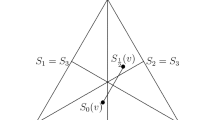Abstract
Abstract aggregations are defined and pertinent conditions of decisiveness, anonymity, unanimity, independence of irrelevant alternatives (stronger than the Arrowian) and non-dictatoriality (logically independent of the Arrowian) are developed for aggregations of choices. The mode is identified as a compromise aggregating variable societies of choices into a social choice, and it is shown (Theorem 4.1) to satisfy these conditions. This non-dictatorial compromise is then characterized (Theorem 5.1) in terms of three axioms paralleling those characterizing the approval voting of Sertel [7].
Similar content being viewed by others
References
Arrow KJ (1963) Social choice and individual values. Yale University Press, New Haven London
Fishburn PC (1978) Axioms for approval voting: Direct proof. J Econ Theory 19: 180–185
Schofield N (1985) Social choice and democracy. Springer, Berlin Heidelberg New York
Sen AK (1970) Collective choice and social welfare. Holden Day, San Francisco
Sertel MR (1978) Choice by binary comparison is semi-independent of path. Boĝaziçi University J (Economics) 6: 93–97
Sertel MR (1981) Explorations in aggregating choices. Memorandum Nr. 356, Department of Applied Mathematics, Twente University of Technology (Forthcoming in: Math Soc Sci)
Sertel MR (1986) Characterizing approval voting. Boĝaziçi University Research Papers, ISS/E 86-14 (Forthcoming in: J Econ Theory)
Sertel MR, Van der Bellen A (1979) Synopses in the theory of choice. Econometrica 47, 6: 1367–1389
Sertel MR, Van der Bellen A (1980) Computations in choice groupoids. Aeq Math 20, 2/3: 129–132
Sertel MR, Van der Bellen A (1980) Routes and paths of comparison and choice. Public Choice 35: 205–218
Sertel MR, Van der Bellen A (1980) On the routewise application of choice. J Econ Theory 22: 423–438
Sertel MR, Van der Bellen A (1982) Comparison and choice. Theory Decision 14: 35–50
Smith JH (1973) Aggregation of preferences and variable electorate. Econometrica 47: 1027–1041
Author information
Authors and Affiliations
Additional information
This paper has benefited from helpful discussions with a number of colleagues and students, who are hereby thanked without being implicated for any remaining failings. In particular, earlier versions received the useful comments of participants at the Eighth and Ninth Bosphorus Workshops on Industrial Democracy, July 1983 and August 1984, Boĝaziçi University, Istanbul: most notably, Nick Baigent, Faruk Gül and Dennis Mueller. The help of Ünal Zenginobuz is also gratefully acknowledged. Finally, an anonymous referee's suggestions led to the addition of clarifying notes relating the notions of independence of irrelevant alternatives and of non-dictatoriality here to the usual Arrowian ones, and it is due to this referee's instigation that the characterization of the mode in Sect. 5 was produced.
Rights and permissions
About this article
Cite this article
Sertel, M.R. A non-dictatorial compromise. Soc Choice Welfare 5, 19–29 (1988). https://doi.org/10.1007/BF00435495
Received:
Accepted:
Issue Date:
DOI: https://doi.org/10.1007/BF00435495




